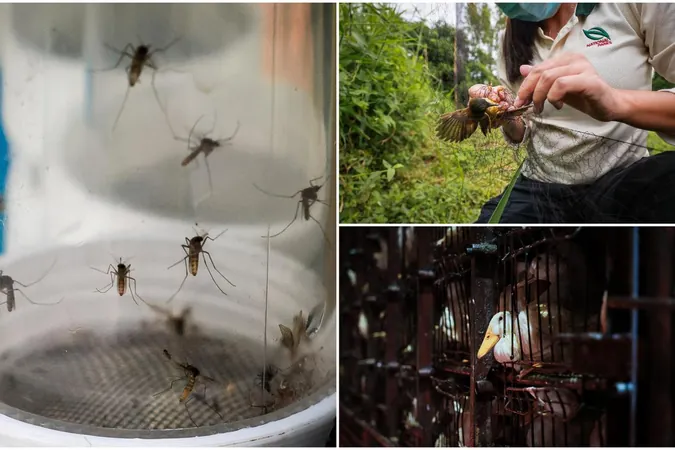
Singapore's Urgent Call for Research: Uncovering Zoonotic Diseases that Threaten Human Health
2025-01-05
Author: Wei
Singapore's Active Research Against Zoonotic Diseases
In a race against time, researchers in Singapore are actively seeking to pinpoint diseases that could leap from animals to humans, a task that has gained newfound importance following recent global outbreaks.
Bird Capture and Research Initiatives
On December 5, 2024, in the lush habitats of Pulau Ubin, a small yet significant event unfolded. A black-browed reed warbler, barely the size of a human palm, became ensnared in a carefully placed mesh net set up at dawn to coincide with the migratory season. This was no ordinary capture; it marked the efforts of Dr. Gabriel Low, a researcher with the National Parks Board (NParks), whose work focuses on identifying potential disease-causing pathogens in wildlife threatening Singapore's health.
After gathering critical samples from the caught bird, Dr. Low ensured it was safely returned to its habitat. His actions underscore a growing understanding worldwide of the vital connection between environmental health and human well-being, as emphasized by the World Health Organization (WHO).
Call for Research Proposals
In a proactive move, NParks announced a call for research proposals aimed at strengthening Singapore's defenses against future zoonotic disease outbreaks—diseases that transfer from animals to humans. This initiative, part of a larger $15 million biosurveillance program, is open for submissions until March 28.
The ongoing threat of zoonotic diseases is underscored by the recent mpox outbreak, declared a public health emergency by WHO in August 2024. It is a stark reminder of how quickly animal-borne diseases can escalate.

 Brasil (PT)
Brasil (PT)
 Canada (EN)
Canada (EN)
 Chile (ES)
Chile (ES)
 Česko (CS)
Česko (CS)
 대한민국 (KO)
대한민국 (KO)
 España (ES)
España (ES)
 France (FR)
France (FR)
 Hong Kong (EN)
Hong Kong (EN)
 Italia (IT)
Italia (IT)
 日本 (JA)
日本 (JA)
 Magyarország (HU)
Magyarország (HU)
 Norge (NO)
Norge (NO)
 Polska (PL)
Polska (PL)
 Schweiz (DE)
Schweiz (DE)
 Singapore (EN)
Singapore (EN)
 Sverige (SV)
Sverige (SV)
 Suomi (FI)
Suomi (FI)
 Türkiye (TR)
Türkiye (TR)
 الإمارات العربية المتحدة (AR)
الإمارات العربية المتحدة (AR)